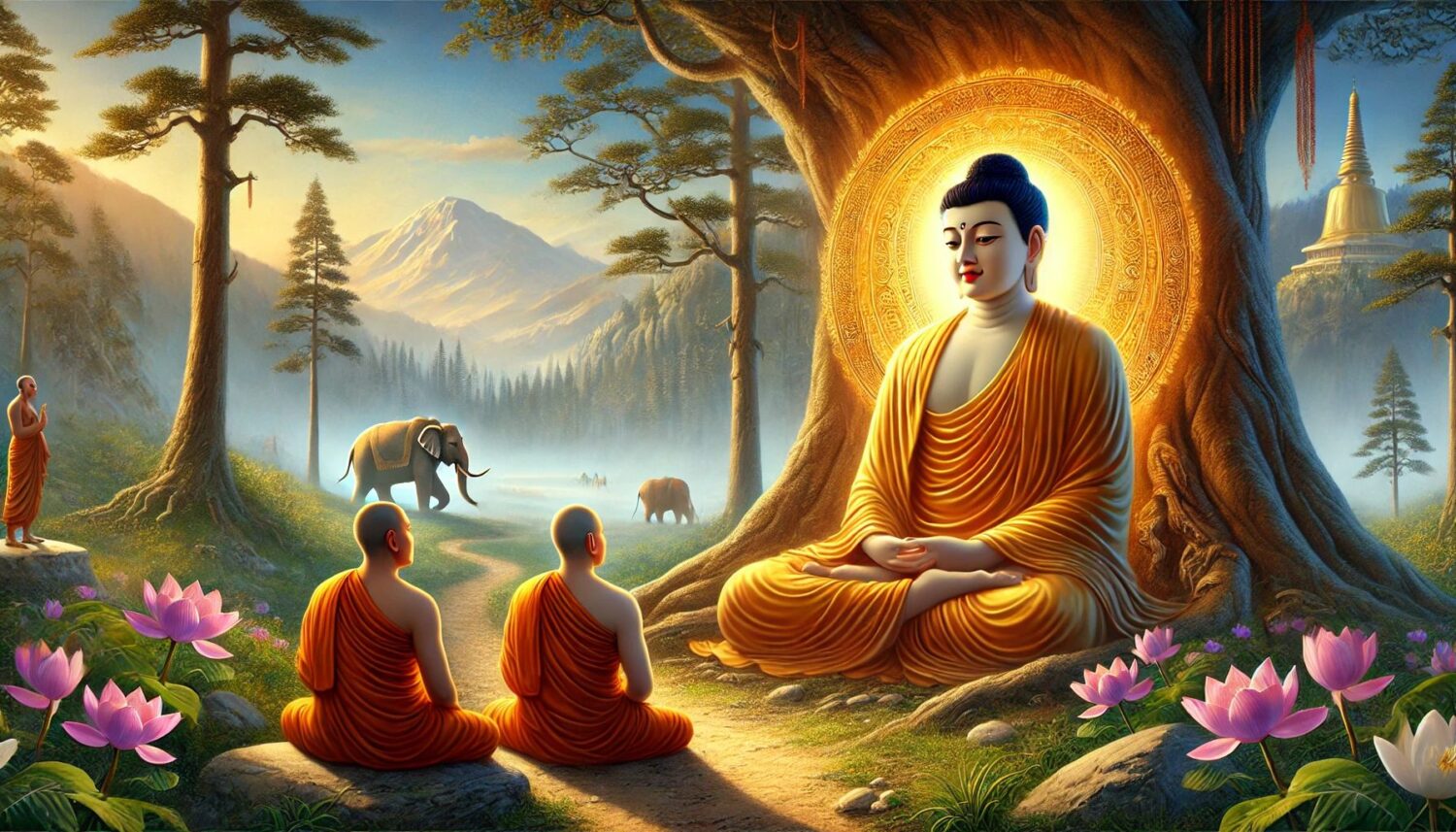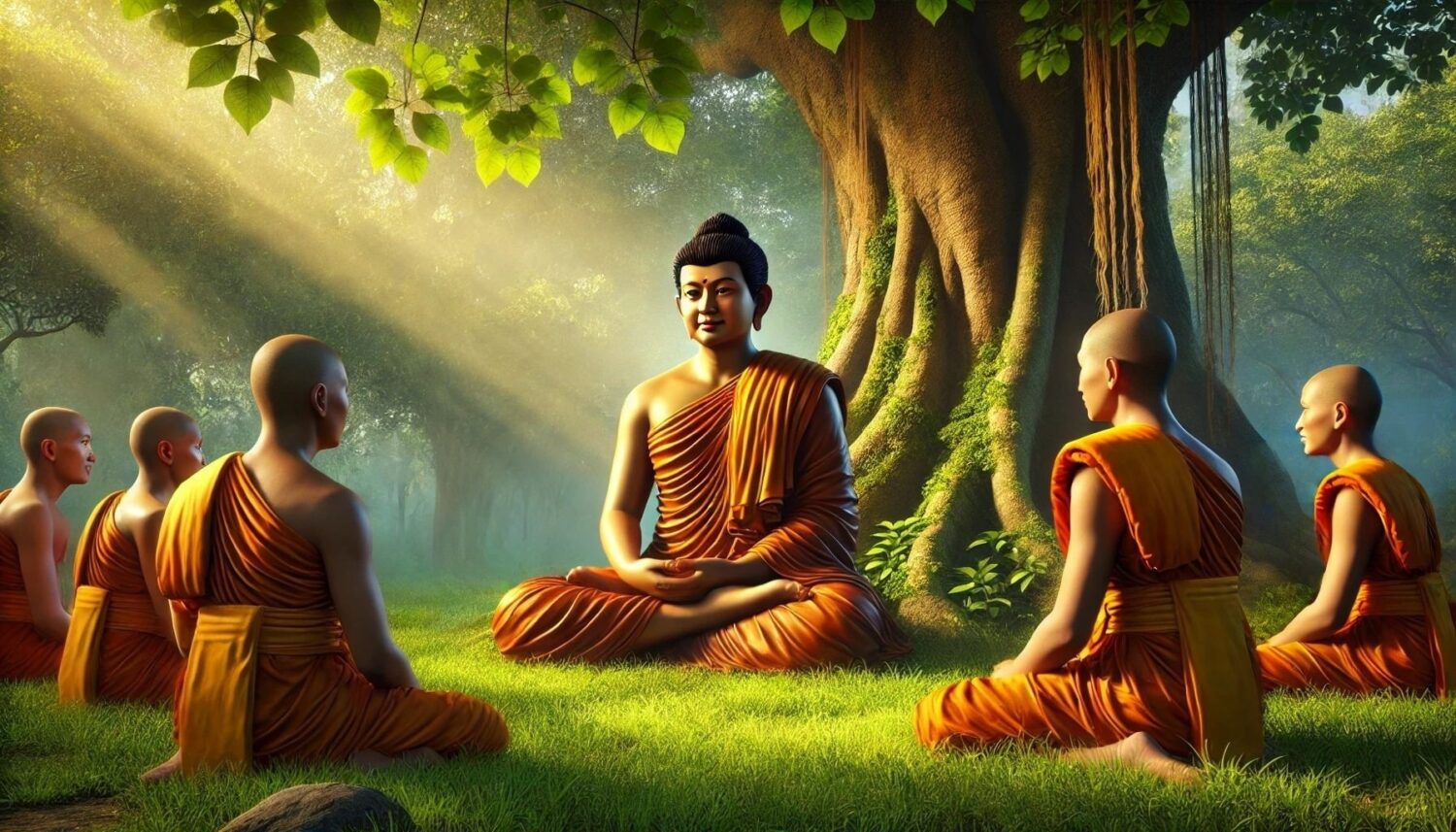
Date: 05/03/2025 05/04/2025
Location: Star Lake Meditation Center
Teacher: Shilin Long
Dharma Talk
The Young Woman Kāśyapa Converts the Heretical Brāhmin Bhiśuka
The story of the young woman Kāśyapa converting the heretical Brāhmin Bhiśuka took place shortly after the Buddha entered Parinirvāṇa. At that time, King Prasenajit of Kosala bestowed the village of Sipohi upon the Brāhmin Bhiśuka.
The young woman Kāśyapa, along with five hundred monks, traveled to this place. The villagers had long heard of Kāśyapa’s vast knowledge, eloquence, and impeccable wisdom, so they eagerly gathered to seek teachings from her.
Brāhmin Bhiśuka had never believed in the existence of future lives, karma, or the consequences of good and evil deeds. He went to challenge her directly.
Bhiśuka said, “In my view, there is no such thing as future lives, rebirth, or karma and its consequences.”
Kāśyapa asked, “Then tell me, do you believe that the sun and the moon belong to this world or another world? Were they created by humans or by divine beings?”
Bhiśuka replied, “The sun and the moon belong to another world, not this one. They were created by the gods, not by humans.”
Kāśyapa said, “From this, we can deduce that there must be another world and that the consequences of good and evil deeds must exist.”
Bhiśuka responded, “I still do not believe it!”
Kāśyapa then asked, “What causes and conditions lead you to firmly believe that there are no future lives, no rebirth, and no consequences for good and evil deeds?”
Bhiśuka said, “I once had a close friend who was gravely ill and nearing death. When I visited him, we made an agreement: ‘If there truly is a hell as the ascetics claim, then given your lifetime of committing the ten evil deeds, you will surely fall into hell.
If that happens, you must return to tell me, so I will believe in hell, karma, and retribution!’ However, until now, he has never come back. Given our deep friendship, he would not have broken his promise. Therefore, there is no future life, no rebirth, and no consequences for good and evil deeds!”
Kāśyapa gave an analogy: “There was once a thief who was captured by the king and was about to be taken to the execution ground. Along the way, he pleaded with the guards, saying, ‘Please let me return home to say farewell to my family, and I promise I will come back!’ Tell me, would the guards let him go back?”
Bhiśuka replied, “Of course not!”
Kāśyapa said, “Similarly, how could the guards of hell possibly allow your friend to return?”
”Therefore, your belief is mistaken.”
Bhiśuka continued, “However, I had another friend who practiced the ten good deeds diligently. Before he passed away, I also made an agreement with him: ‘If you are reborn in the heavens, you must return to tell me, so I will believe in the existence of future lives and the consequences of good and evil deeds.’ Yet, until now, he has never returned!”
Kāśyapa responded with another analogy: “Suppose a man fell into a latrine. The king not only sent people to rescue him, but also bathed him with fragrant water, applied fine perfumes and powders, dressed him in the finest clothes, and provided him with delicious food, music, and entertainment. Do you think this person would want to go back and soak in the filthy latrine?”
Bhiśuka said, “Of course not! The latrine is so foul and repugnant!”
Kāśyapa said, “To celestial beings, this human world is as repulsive as a latrine. The scent of Jambudvīpa (the human world) can be detected from a hundred yojanas away. Your friend, having cultivated the ten good deeds and ascended to heaven, is enjoying unparalleled bliss. Why would he ever return to this filthy realm of Jambudvīpa?”
Bhiśuka continued, “I had yet another friend who upheld the Five Precepts. According to the ascetics, he should have been reborn in the Trāyastriṃśa Heaven after death. Before he passed away, we agreed that if he was reborn in heaven, he would return and inform me. However, I have not seen him since. That is why I do not believe in future lives and karma.”
Kāśyapa explained, “One hundred human years equal just one day and night in the Trāyastriṃśa Heaven. Your friend, having been reborn there due to his observance of the Five Precepts, would surely want to enjoy himself for two or three days before coming to find you. But by then, would you still be here to see him?”
Bhiśuka replied, “Two or three days in the Trāyastriṃśa Heaven is two or three hundred years in the human world. By that time, I will be long gone! Even if you put it this way, who can verify that the lifespan in the Trāyastriṃśa Heaven is truly as you claim?”
Kāśyapa gave another analogy: “There are people who are blind from birth. They cannot perceive colors, shapes, or sizes, nor have they ever seen the sun, moon, stars, mountains, or rivers. If such a person were to say that these things do not exist, would that be correct?”
Bhiśuka replied, “Of course not. The world inherently possesses blue, yellow, red, and white colors, as well as mountains, rivers, lands, and celestial bodies. Just because a blind person cannot see them does not mean they do not exist.”
Kāśyapa said, “Similarly, just because you do not know the lifespan of celestial beings does not mean it does not exist.”
Bhiśuka argued, “Ascetics claim that human beings have a consciousness. However, when people die, no one has ever seen their consciousness leave their bodies, so I do not believe in future lives.”
Kāśyapa countered, “When you sleep in a high building, have you ever dreamt of mountains, rivers, forests, and streets?”
Bhiśuka replied, “Yes.”
Kāśyapa asked again, “When you were sleeping, were there guards watching over you?”
Bhiśuka said, “Yes.”
Kāśyapa asked, “When you dreamt of mountains, rivers, forests, and streets, did the guards ever see your consciousness leave your body? And when you woke up, did the guards see your consciousness return?”
Bhiśuka replied, “No.”
Kāśyapa concluded, “Even when you are alive, people cannot see your consciousness enter or leave your body, let alone when a person is dead. In Buddhism, monks diligently cultivate the path and attain pure divine vision through meditative concentration. With their celestial eyes, they can perceive the length of life and the consequences of good and evil actions. Just because your physical eyes cannot see something does not mean that it does not exist.”
Finally, Bhiśuka admitted, “Venerable one, when you first asked me whether the sun and moon belonged to this world or another, I already realized my mistake. The reason I kept questioning was to test your eloquence and wisdom, and now I have complete faith in you.”
Kāśyapa said, “You should take refuge in my teacher, the World-Honored One.”
Bhiśuka asked, “Where is the World-Honored One now?”
Kāśyapa replied, “The World-Honored One has recently entered Parinirvāṇa.”
Bhiśuka said, “In that case, I take refuge in the Tathāgata, the Dharma, and the Sangha. From now on, I will uphold the Five Precepts for the rest of my life and practice generosity extensively.”
Thus, not only was the Brāhmin Bhiśuka converted, but all the other Brāhmins and laypeople present were also filled with Dharma joy and developed unwavering faith in the Buddha’s teachings.

